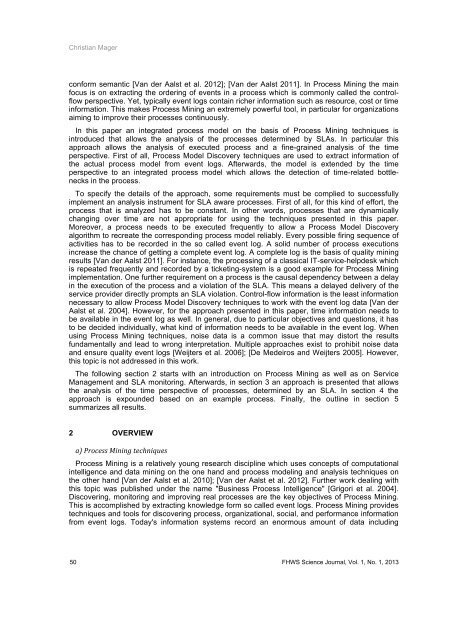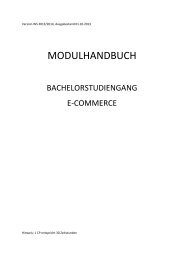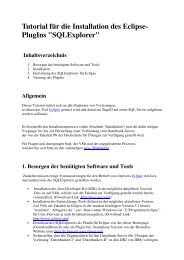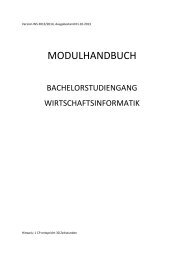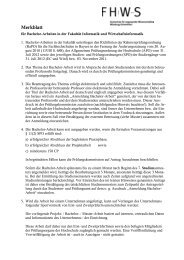FHWS Science Journal - Fakultät Informatik und Wirtschaftsinformatik
FHWS Science Journal - Fakultät Informatik und Wirtschaftsinformatik
FHWS Science Journal - Fakultät Informatik und Wirtschaftsinformatik
You also want an ePaper? Increase the reach of your titles
YUMPU automatically turns print PDFs into web optimized ePapers that Google loves.
Christian Mager<br />
conform semantic [Van der Aalst et al. 2012]; [Van der Aalst 2011]. In Process Mining the main<br />
focus is on extracting the ordering of events in a process which is commonly called the controlflow<br />
perspective. Yet, typically event logs contain richer information such as resource, cost or time<br />
information. This makes Process Mining an extremely powerful tool, in particular for organizations<br />
aiming to improve their processes continuously.<br />
In this paper an integrated process model on the basis of Process Mining techniques is<br />
introduced that allows the analysis of the processes determined by SLAs. In particular this<br />
approach allows the analysis of executed process and a fine-grained analysis of the time<br />
perspective. First of all, Process Model Discovery techniques are used to extract information of<br />
the actual process model from event logs. Afterwards, the model is extended by the time<br />
perspective to an integrated process model which allows the detection of time-related bottlenecks<br />
in the process.<br />
To specify the details of the approach, some requirements must be complied to successfully<br />
implement an analysis instrument for SLA aware processes. First of all, for this kind of effort, the<br />
process that is analyzed has to be constant. In other words, processes that are dynamically<br />
changing over time are not appropriate for using the techniques presented in this paper.<br />
Moreover, a process needs to be executed frequently to allow a Process Model Discovery<br />
algorithm to recreate the corresponding process model reliably. Every possible firing sequence of<br />
activities has to be recorded in the so called event log. A solid number of process executions<br />
increase the chance of getting a complete event log. A complete log is the basis of quality mining<br />
results [Van der Aalst 2011]. For instance, the processing of a classical IT-service-helpdesk which<br />
is repeated frequently and recorded by a ticketing-system is a good example for Process Mining<br />
implementation. One further requirement on a process is the causal dependency between a delay<br />
in the execution of the process and a violation of the SLA. This means a delayed delivery of the<br />
service provider directly prompts an SLA violation. Control-flow information is the least information<br />
necessary to allow Process Model Discovery techniques to work with the event log data [Van der<br />
Aalst et al. 2004]. However, for the approach presented in this paper, time information needs to<br />
be available in the event log as well. In general, due to particular objectives and questions, it has<br />
to be decided individually, what kind of information needs to be available in the event log. When<br />
using Process Mining techniques, noise data is a common issue that may distort the results<br />
f<strong>und</strong>amentally and lead to wrong interpretation. Multiple approaches exist to prohibit noise data<br />
and ensure quality event logs [Weijters et al. 2006]; [De Medeiros and Weijters 2005]. However,<br />
this topic is not addressed in this work.<br />
The following section 2 starts with an introduction on Process Mining as well as on Service<br />
Management and SLA monitoring. Afterwards, in section 3 an approach is presented that allows<br />
the analysis of the time perspective of processes, determined by an SLA. In section 4 the<br />
approach is expo<strong>und</strong>ed based on an example process. Finally, the outline in section 5<br />
summarizes all results.<br />
2 OVERVIEW<br />
a) Process Mining techniques <br />
Process Mining is a relatively young research discipline which uses concepts of computational<br />
intelligence and data mining on the one hand and process modeling and analysis techniques on<br />
the other hand [Van der Aalst et al. 2010]; [Van der Aalst et al. 2012]. Further work dealing with<br />
this topic was published <strong>und</strong>er the name "Business Process Intelligence" [Grigori et al. 2004].<br />
Discovering, monitoring and improving real processes are the key objectives of Process Mining.<br />
This is accomplished by extracting knowledge form so called event logs. Process Mining provides<br />
techniques and tools for discovering process, organizational, social, and performance information<br />
from event logs. Today's information systems record an enormous amount of data including<br />
50 <strong>FHWS</strong> <strong>Science</strong> <strong>Journal</strong>, Vol. 1, No. 1, 2013


